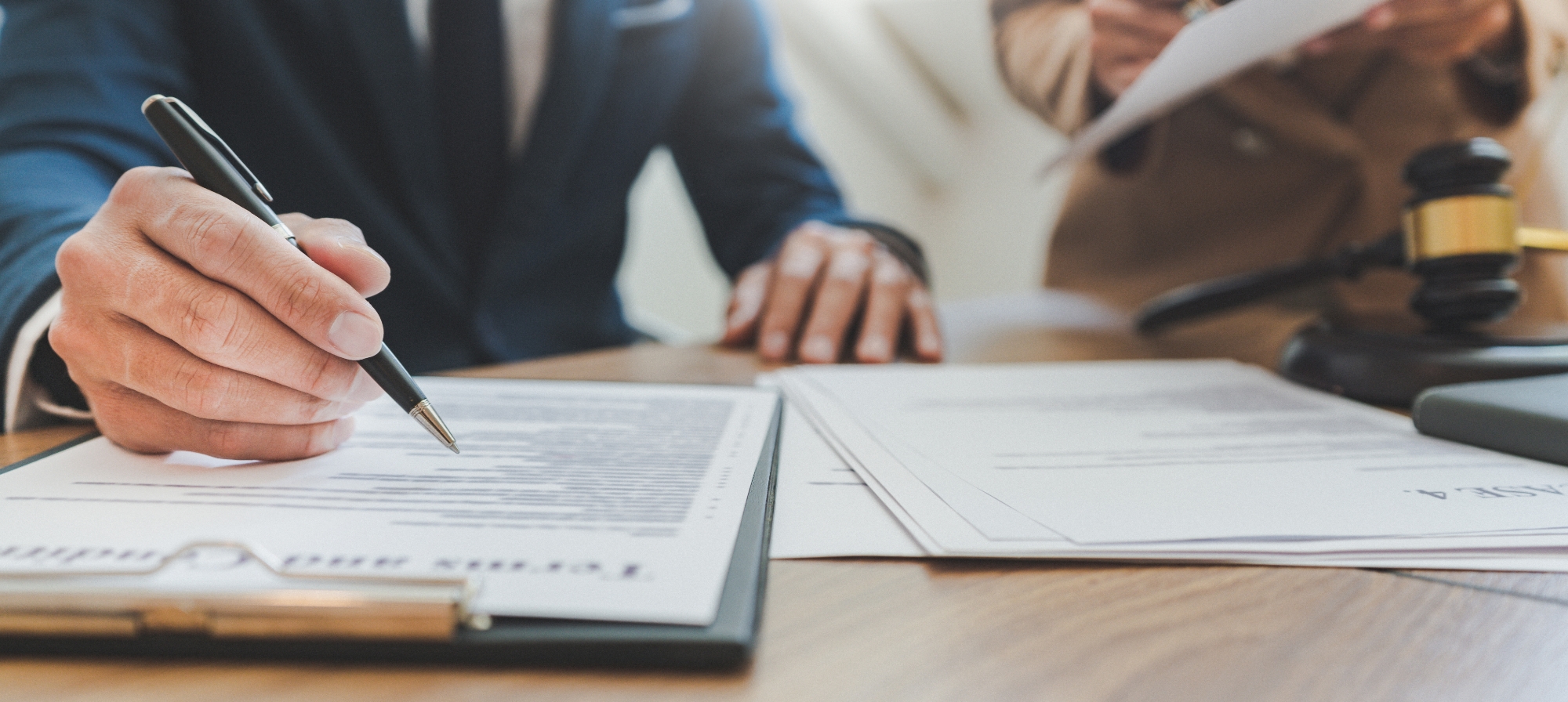If you’ve suffered a personal injury that wasn’t your fault and you need to file a civil lawsuit to get the compensation you deserve, sooner or later you will likely have to provide your personal testimony in a deposition.
Although depositions are not given before a judge, the things that you say will be considered admissible evidence, which means it could be presented during a trial. A good or bad performance in a deposition could significantly influence your settlement or trial, so it is critically important to be as prepared as possible.
A deposition can be an intimidating prospect, and our clients often have questions about what to expect. In this blog post, the Crosley Law team will go over what you can expect from the deposition process, how to prepare for a deposition, and rules to follow as you answer questions carefully.
What Is a Deposition?
A deposition is a question and answer session, conducted under oath, as part of the discovery process of your personal injury lawsuit.
During a deposition, both your San Antonio personal injury lawyer and the insurance company attorney will have a chance to ask you questions about your personal injury claim. These questions and your responses are either transcribed (written down word for word) by a court reporter or video recorded. Your statements are considered evidence and can be presented to the judge or jury if your case goes to trial.
Depositions are an important part of any personal injury lawsuit. A strong, factually consistent deposition can strengthen your personal injury claim and might lead to a bigger settlement. However, a flawed deposition can undermine your credibility and devalue your claim.
Defense lawyers are constantly looking for inconsistencies and ulterior motives in personal injury claims. A simple misunderstanding or misstatement might have serious ramifications.
What Kind of Questions Can I Expect?
During your deposition, the insurance company’s lawyer will pepper you with questions about your accident, injuries, and damages. You should expect questions about:
- Your background, including your work history and level of education
- Details about how the accident happened (time, speed, distance, direction of travel, which way were you looking, etc.)
- Physical and emotional injuries you’ve suffered
- Pre-existing conditions and past medical treatment
- The severity and frequency of your symptoms
- The treatment you’ve received and whether it helped
- The names of your doctors and medical providers
- The extent of your limitations and work restrictions
- How your life has changed since the accident
- Medical bills and lost income
Before your deposition, you should review your accident reports, medical records, notes, diaries, and other evidence that might refresh your memory.
It’s important to remember that, in many cases, the defense attorneys already have access to most, if not all, of this information. But they are going to ask you about it anyway. They want to assess whether you are credible, and if they can catch you saying something untrue (even if it’s an innocent mistake) or get you to open up about information that they don’t already have access to you, they may be able to use it against you.
Nine Rules to Follow While Giving Your Deposition Testimony
1. Dress Appropriately and Be Punctual
In a perfect world, what you wear to your deposition shouldn’t matter—only your words, and the truth. Unfortunately, we do not live in that world. The way that you dress can subconsciously influence how others feel about you.
Depositions are also often recorded and seen by others involved in resolving your case—including juries—so it’s important to make a good impression and present yourself in the best possible light.
We recommend that clients dress in clean business casual or “church” clothes. Some people choose to wear a suit and tie if they’re used to wearing them for work, but if you aren’t accustomed to professional attire, a nice shirt will usually suffice. We want you to look nice, but also feel as comfortable as possible so you can focus on your testimony.
You should also show up on time (or early) for your deposition. If you’re late or a no-show, it could negatively affect your case.
2. Always Tell the Truth
After a serious accident, you could be in a lot of physical and emotional pain. You may also have limited memories of the incident.
While you might feel tempted to overstate your symptoms and the facts surrounding your accident, it’s never a good idea. When you exaggerate or are dishonest, the defense lawyer and the insurance company will use these statements against you during settlement negotiations and in court.
Other times, you might not want to admit facts that seem embarrassing or damaging (such as a history of substance abuse). Even if you think an answer will not portray you in the best light, be honest. You will hurt your case if you are evasive or untruthful. Remember, the opposing attorney already has access to all the evidence that both sides will be presenting. If you lie, you will be caught.
If you have concerns about tough questions or difficult topics, discuss them in advance with your San Antonio personal injury lawyer. Your lawyer might have suggestions or strategies that will help you frame your testimony.
3. Listen Carefully and Make Sure You Understand the Question
Lawyers can, and often do, ask confusing questions. Sometimes they do it by accident, because they forget that not everyone has a law school education. Other times they do it on purpose, because they’re hoping to trip you up and get you to say something untruthful.
If you aren’t absolutely certain what you’re being asked, don’t answer. Instead, you may ask the attorney to:
- Repeat the entire question.
- Rephrase the question.
- Explain what they mean by a specific word or phrase.
There’s no limit to the number of times you ask for a question to be restated or re-explained. Ask as many times as you need to be sure you can answer fully, honestly, and accurately.
4. Always Ask to See the Documents
As with any other civil matter, personal injury cases lawsuits are built on evidence, including police reports, medical records, letters and emails, photographs, and other documents. Chances are you will be asked about one or more of these documents while you give your deposition, and it’s extremely important that you know what they say.
Your attorney should have access to all the documents that have been entered into evidence and will have a good idea of what opposing counsel is likely to ask you about. Crosley Law’s attorneys will even create a summary of our clients’ medical records and other essential documents and go through them with our clients to ensure they are very familiar with them.
However, no matter how prepared you are beforehand, always take time to read anything the opposing attorney asks you about before you give an opinion. For example, if the lawyer asks whether you agree with a police officer’s opinion on a certain page of the police report, don’t automatically say yes or no.
Always ask them to show you, specifically, which section of the document they’re talking about—or even ask to review the entire document you are being asked about.
Remember, the opposing attorney is attempting to catch you in a “lie.” Even if you are being as honest as possible, accidental misstatements or moments of forgetfulness can be damaging to your credibility.
5. Don’t Guess or Speculate
The most important thing for a witness to have is credibility, or in other words believability.
If you don’t know the answer to a question, don’t try to come up with an answer that you think might be the right one. If you’re doing your best to answer questions honestly, the absolutely worst thing you can do is to make a guess in your deposition, and have that guess turn out to be wrong. The opposing attorney will seize on that mistake and use it to imply that you were lying, or at the very least the rest of your testimony cannot be trusted.
Instead, it’s far safer to say things like:
- I don’t recall
- I’m not sure at this time
- I would have to check my records before I can answer that question
This is a difficult rule that doesn’t always come naturally when answering questions. Many people have a natural tendency in conversation to “fill in the gaps” with speculation, and may worry that saying “I don’t know” will make them look evasive, stupid, or guilty.
However, it’s important to stay disciplined here. Remember the second rule: Always tell the truth. If you aren’t sure, the best thing to do is say that you aren’t sure.
It’s important to stay disciplined here. Remember the second rule: Always tell the truth. If you aren’t sure, the best thing to do is say that you aren’t sure.
6. Only Answer the Question That’s Being Asked
Volunteering information beyond the scope of the original question comes back to haunt many witnesses in depositions.
If you answer a simple yes or no question with three minutes of testimony—or even just a few sentences—you may inadvertently provide contradictory information or give the opposing attorney enough information to ask several additional follow-up questions you weren’t prepared for.
Again, many people have a natural tendency in conversation—especially when they’re nervous—to fill in the gaps and silences and expand on what they’ve been asked. But when you volunteer information that you were never asked about, it cannot help your case. You are only giving the opposing lawyer additional evidence that they can potentially use against you.
7. Keep Your Answers Short and to the Point
Even when sticking to the question that’s being asked, you should still try to keep your answers brief. You should almost never give long, detailed answers to a defense lawyer’s questions. Give the simplest, most honest answer you can—and stop talking once you’ve answered the question.
A deposition is not the time to tell your full story. Instead, it’s a chance for the defense lawyers to build their case against you. Don’t do their job for them. Your own lawyer will have a chance to cross-examine you at the end of the deposition. Depending on your case and litigation strategy, your lawyer might try to flesh out your answers at that time.
There are a few exceptions to this rule. For example, if you’re asked an open-ended question about whether your personal injury has affected your life, that would be a cue to offer up more detail. However, don’t forget the earlier rules: tell the truth, don’t exaggerate or speculate.
Your lawyer will go over any other exceptions to this rule with you before your deposition. And remember, if you aren’t sure how to answer a question, you can always ask for more information.
8. Take Your Time When You Testify
When you testify, a few seconds of silence can feel like an eternity. Sometimes, accident victims feel like they have to provide quick answers.
However, if you need time to think, take all the time you need. Formulate your answer before you speak. Your personal injury lawyer will want you to deliver thoughtful, accurate answers to every question. There is no time limit, and the deposition transcript will not record how long you took.
9. Stay Professional and Polite
Depositions are often stressful for witnesses. Emotions can run hot. The defense lawyer will probably ask you personal or uncomfortable questions, trying to shake your confidence or undermine your credibility.
Don’t take the bait. Always conduct yourself in a professional manner, even if you’re nervous or frustrated.
If you become combative or angry, the defense lawyer will use your bad behavior against you. If you need a break to calm down, compose yourself, use the restroom, or just clear your mind, ask for one. Depositions aren’t meant to be grueling tests of endurance, and reasonable break requests are usually granted.
If you have a personal injury lawyer, he or she will also attend your deposition. When the insurance company’s lawyer asks inappropriate or leading questions, your lawyer should object under the rules of evidence or civil procedure and can try to exclude this testimony at trial. Your attorney should also have access to the written transcript of the deposition once it becomes available and can review it for accuracy—court reporters sometimes make errors.
Always Consult with a Personal Injury Lawyer Before Participating in a Deposition
Depositions are highly formal and technical interviews. It’s in your best interest to have a personal injury lawyer effectively prepare you for your deposition testimony, and then be present with you at your deposition.
Lawyers are trained to assess evidence and guide people through the formal discovery process of a claim. Your lawyer can work closely with you to help you understand the process and coach you in how to respond to questions.
At Crosley Law, we take a hands-on approach to deposition prep. Our clients receive worksheets and checklists beforehand, helping them understand the questions they might face. We also meet with our them before the deposition, reviewing evidence, discussing tactics, and practicing testimony. Our goal is to give our clients all the tools they’ll need for a successful deposition.
And because we have handled so many San Antonio personal injury cases over the years we can often provide our clients with our personal knowledge about specific insurance companies or even attorneys. Recently, we guided a client named Michael through a tough deposition and were even able to prepare him for what to expect from a particular lawyer.
Michael comments, “The whole process of going (or possibly going) to court was very nerve-wracking and intimidating, but having this team on my corner definitely helped put me at ease and feel confident I was going to get the help I deserved.”
“The whole process of going (or possibly going) to court was very nerve-wracking and intimidating, but having this team on my corner definitely helped put me at ease and feel confident I was going to get the help I deserved.”
Michael
Crosley Law: Personal Injury Attorneys You Can Rely On
Depositions can be nerve-wracking, especially if you’ve never given one before. But with a good attorney guiding you and a bit of preparation, you can enter the deposition room with confidence.
At Crosley Law, we know that well-prepared clients give the best possible depositions. We represent personal injury victims in San Antonio and throughout Texas, and we handle a wide variety of personal injury claims. Before you speak with an insurance adjuster or defense lawyer, complete our simple, online form or call us at 210-LAW-3000 | 210-529-3000. We offer a free consultation and a no-fee policy.
The content provided here is for informational purposes only and should not be construed as legal advice on any subject.









